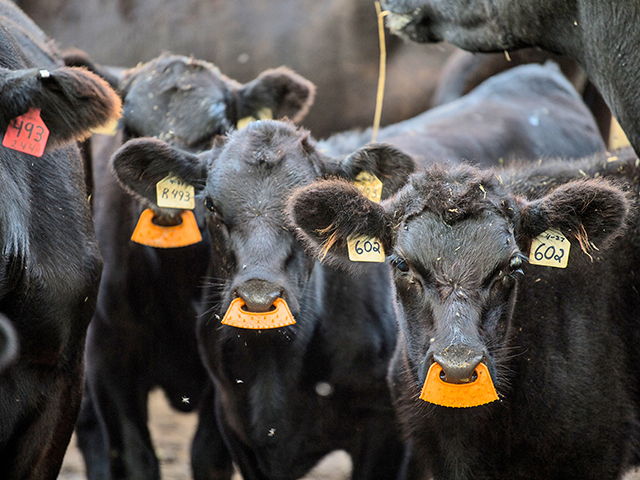High Demand for Certified Cattle
Bid Up Calf Prices
The folks at Western Video Market look at sale cattle all day, every day, to the tune of 300,000 head or more each year. Those cattle come from about 850 consignors and sell through the market's national video auction enterprise, launched in 1989. Today, the group is the second-largest video sales company for cattle in the U.S.
With that kind of experience, these sellers know what cattle buyers want. More importantly for sellers, they know what buyers are willing to pay for the ever-elusive premium. Make no mistake: It's a moving target. But, certain qualities never go out of style, starting with Beef Quality Assurance (BQA).
Holly Foster is operations manager for Western Video Market, based in Cottonwood, California. She says one of the first things buyers look for is 50,000-pound load lots. They want loads to be uniform, vaccinated, sometimes breed-specific and originating from an operation with a good overall health plan in place.
"We sell through a video auction format, but that's not to say there's no place for brick and mortar yards in what we do," she says. "We work collaboratively with those operations. They can put cattle into a live sale and know if a consignor has a load lot and if they are doing the extra work like good breeding, genetics, health or even taking on some value-added third-party verifications; those cattle will be the ones buyers want. Buyers today are keyed into consumer demand, both internationally and domestically. This, to a large extent, is driving what they are buying."
STARTING POINTS
For most buyers, willingness to pay a premium starts with source and age verification. From there, Foster says they look for natural, or nonhormone-treated animals. The criteria are tied to export regulations, but it also plays a role in domestic sales.
"This is where BQA really comes into play," she explains. "Essentially, all producers participating in any type of value-added program have done that foundational setup to be BQA-certified. We see that as the beginning, and we see more money on BQA-certified sales, almost $3 [per cwt] based on seven years of data."
That data comes from a Colorado State University (CSU) study where researchers used Western Video Market data to show the financial value of BQA.
P[L1] D[0x0] M[300x250] OOP[F] ADUNIT[] T[]
"Anecdotally, we knew there was value," Foster says. "BQA certification means a producer is doing a lot of things right, from breeding to mineral use, health, nutrition, even managing forages and pastures. The Colorado study drills down so we can see the value for BQA certification, especially in the arena of video sales."
A LOOK AT THE NUMBERS
"Estimating the Effect of Beef Quality Assurance on Video Cattle Prices in the U.S. West," a CSU paper, was led jointly by the departments of animal sciences and agricultural and resource economics. Authors were Daniel Mooney, Miles Rollison and Jason Ahola.
The study looked at written lot descriptions on cattle marketed via video auctions to see how these value-added practices impacted price in that venue. They focused on lots sold through Western Video Market from 2000 to 2017 using the terms "BQA," "BQA certification" and/or where consignors noted they followed BQA guidelines.
The top states for BQA mentions were Montana, Nebraska, Nevada, New Mexico and Wyoming. Looking at sales prices, lots in nine Western states that sold and mentioned BQA in the description brought an average premium of $16.80 per head, or $2.71 per cwt. The data implied higher, weight-based premiums for lighter 450-pound calves during that period, at $3.73 per cwt.
Comparing average premiums by value-added category, the report noted while BQA showed a $2.71 per cwt price advantage, other components, including production and health-management practices, export verification programs and consumer-driven verified and third-party labeling programs, could add to that number.
Foster says the findings indicate premium trends strongly follow consumer preferences. "A lot of buyers today want to see a good herd health program. That would include information on vaccination protocols. Some of these protocols are certified, and the producer works cooperatively with animal pharmaceutical companies to be able to offer third-party verification. Our own health verification program relies on field reps to verify consignors have records of what products were used. Good, accurate information is increasingly important to buyers and something they will pay for."
She adds there is growth in third-party verification programs today, with a handful of major companies handling the majority of audits.
"The foundational program is often source- and age-verified," Foster explains. "From there we see people bump up with nonhormone and verified natural, if that fits their production protocols. We see animal-welfare and handling claims that fit certain market specs. There is a non-GMO claim a lot of buyers want now. These different verification claims can be layered on depending on production system and what a producer feels is worth the time. There has to be a return to make it work."
With so much talk around sustainability in the cattle business today, producers often ask if there is a premium tied to that. In the U.S., Foster says some lots of cattle are sold as certified organic, a label that includes a sustainability component.
"There is also a middle ground with the verified natural programs, and a couple of animal-welfare and animal-handling programs," Foster says. But, regardless of where a producer may want to go with a herd, it all starts back at BQA.
"What helps a producer build into any of these areas starts with good herd health, vaccinations and recordkeeping. We encourage consignors to participate in BQA for a lot of reasons, but one is simply that it helps us tell the story of what we as an industry do so well."
**
FOR MORE INFORMATION:
-- USDA-Approved Process Verified Programs: https://www.ams.usda.gov/…
-- IMI Global Third-Party Verification Services: www.imiglobal.com/third-party-programs
[PF_0621]
(c) Copyright 2021 DTN, LLC. All rights reserved.




